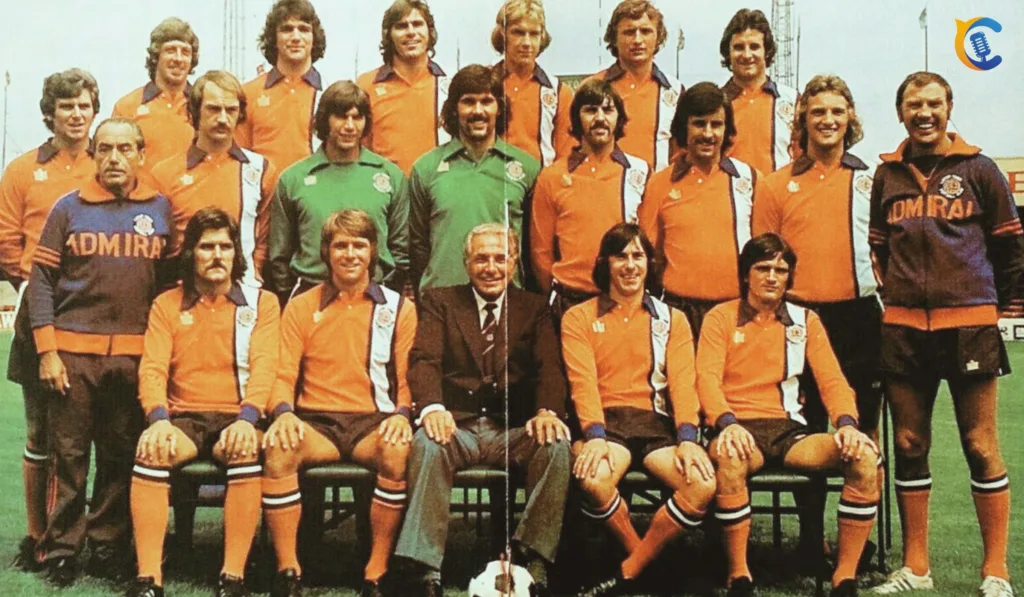Luton Town FC / Luton Town Football Club / Football Club / Luton Town Football Team
Table of Contents
Introduction

Football has an incredible power to unite people, and Luton Town Football Club epitomizes the spirit of this beautiful sport. As one of England’s oldest and most esteemed football clubs, Luton Town FC boasts a rich history deeply intertwined with its local community. This blog post embarks on a captivating journey through the club’s triumphs and challenges, celebrating the essence of Luton Town FC.
Origins and Early Days
Founded in 1885, Luton Town FC, initially known as “Luton Excelsior,” swiftly gained popularity within its community. The club adopted its current name in 1890, forging a strong identity among its devoted fans. In the early years, Luton Town experienced both successes and challenges, participating in various leagues and competitions. However, it wasn’t until 1955 when they achieved a significant breakthrough by winning the Second Division (now the Championship), earning a place in the top tier of English football for the first time in their history.

The Golden Era
The 1980s marked a glorious period for Luton Town FC. Under the leadership of David Pleat and later Ray Harford, the club soared to new heights. A remarkable highlight during this era was their victory in the 1988 Football League Cup final, where they triumphed over Arsenal in a thrilling 3-2 victory at Wembley Stadium. This milestone victory not only secured Luton Town’s first major trophy but also remains an enduring memory cherished by their fans.
Furthermore, in the 1986-87 season, Luton Town impressively finished seventh in the top division (formerly known as the First Division), further solidifying their reputation as a formidable team in English football.
Challenges and Resurgence
Following their success in the 1980s, Luton Town FC faced a series of challenges, including financial difficulties and managerial changes. Unfortunately, these difficulties resulted in relegation from the top tier in 1992. For over a decade, the club struggled in lower divisions, facing relegation and even enduring administration at one point. Nevertheless, the unwavering support of their loyal fans sustained the team during these trying times.
The turning point came in the mid-2000s when Luton Town began to experience a revival under the guidance of Mike Newell and later Mick Harford. In the 2004-2005 season, the club achieved promotion back to the second tier (now the Championship).
Modern Era and Community Connection
In recent years, Luton Town FC has been on an upward trajectory, consolidating its position in the Football League Championship and making a remarkable return to the English Football League (EFL) Championship after a decade in lower divisions. The club’s investment in its youth academy has proven fruitful, nurturing young talents and securing the team’s future success.
Beyond football, Luton Town FC actively engages in various community initiatives, supporting local charities and promoting youth development. This strong connection to its community sets the club apart, reinforcing its position as not just a football club but a symbol of unity and pride for the town.
Luton Town Football Club: key facts
Luton Town FC: key strength
- Strong Fan Base: Luton Town enjoys passionate and loyal support from its fan base. The club has a dedicated following that creates a vibrant atmosphere at home matches, providing motivation to the players.
- Youth Development: The club has a successful youth academy that has produced talented players who have gone on to make significant contributions to the first team. This commitment to youth development helps maintain a strong squad.
- Stability and Ownership: Luton Town has had relatively stable ownership and management, which can provide the club with a sense of direction and consistency in its approach.
- Community Engagement: The club actively engages with the local community through various initiatives and programs. This community involvement fosters goodwill and support.
- Historical Significance: Luton Town has a rich history in English football, including past successes, which adds to the club’s identity and prestige.
- Competitive Spirit: The team exhibits a competitive spirit and a never-give-up attitude on the pitch, which has led to remarkable comebacks and memorable victories.
- Home Advantage: Luton Town benefits from the home advantage at Kenilworth Road, where the team often performs well in front of their home crowd.
- Adaptability: The club has shown adaptability in its playing style and tactics, allowing it to compete effectively in different divisions and against varying opposition.
- Community Stadium Plans: The club’s plans for a new stadium, Power Court, and associated developments demonstrate ambition and a commitment to improving facilities.
- Financial Stability: Luton Town has maintained financial stability, avoiding excessive debt and financial troubles that have plagued some other clubs.
Luton Town FC: key weakness
- Defensive Fragility: Luton Town has often struggled with defensive stability, conceding goals regularly. This weakness has hindered their ability to secure points consistently.
- Lack of Squad Depth: The squad’s depth has been a concern, particularly when dealing with injuries and suspensions. Limited options on the bench can affect their ability to compete effectively.
- Financial Constraints: As a club in the EFL Championship, Luton Town faces financial limitations that can restrict their ability to make significant squad improvements or attract high-profile players.
- Consistency Issues: Luton Town has experienced periods of inconsistency in their performance, making it challenging to maintain a stable position in the league table.
- Struggles Against Top Teams: The club has faced difficulties when competing against some of the stronger teams in the league, impacting their overall points tally.
- Goal-Scoring Challenges: Scoring goals consistently has been an issue, and finding a reliable goal scorer has been a challenge for the club.
- Ownership Concerns: Ownership changes and instability can affect the club’s long-term planning and financial stability.
- Highly Competitive League: The EFL Championship is known for its competitiveness, with several strong teams vying for promotion. This intensifies the challenge of securing a high league position.
- Managerial Changes: Frequent managerial changes can disrupt team cohesion and long-term planning. Finding the right managerial fit has been a challenge.
- Fan Expectations: High fan expectations and the desire for success can create added pressure on the team, affecting player performance.
Luton Town Football Team: Conclusion
Luton Town Football Club stands as a testament to the enduring spirit of football, with a history defined by both triumphs and challenges. Their deep-rooted connection to the local community and their unwavering support demonstrate the true essence of the beautiful game. As they continue to script new chapters in their history, Luton Town FC will undoubtedly leave an indelible mark on the hearts of football enthusiasts for generations to come.
